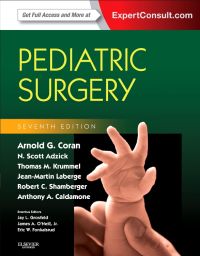Part I • GENERAL
1 History of Pediatric Surgery: A Brief Overview
2 Molecular Clinical Genetics and Gene Therapy
3 Impact of Tissue Engineering in Pediatric Surgery
4 Advanced and Emerging Surgical Technologies and the Process of Innovation
5 Prenatal Diagnosis and Fetal Therapy
6 Neonatal Physiology and Metabolic Considerations
7 Respiratory Physiology and Care
8 Extracorporeal Life Support for Cardiopulmonary Failure
9 Neonatal Cardiovascular Physiology and Care
10 Sepsis and Related Considerations
11 Surgical Implications of Hematologic Disease
12 Nutritional Support in the Pediatric Surgical Patient
13 Pediatric Anesthesia
14 Clinical Outcomes Evaluation and Quality Improvement
15 Ethical Considerations
16 Patient- and Family-Centered Pediatric Surgical Care
Part II • TRAUMA
17 Injury Prevention
18 Infants and Children as Accident Victims and Their Emergency Management
19 Thoracic Injuries
20 Abdominal Trauma
21 Genitourinary Tract Trauma
22 Musculoskeletal Trauma
23 Hand, Soft Tissue, and Envenomation Injuries
24 Central Nervous System Injuries
25 Vascular Injury
26 Burns
27 Child Abuse and Birth Injuries
Part III • MAJOR TUMORS OF CHILDHOOD
28 Principles of Pediatric Oncology, Genetics of Cancer, and Radiation Therapy
29 Biopsy Techniques for Children with Cancer
30 Wilms’ Tumor
31 Neuroblastoma
32 Nonmalignant Tumors of the Liver
33 Malignant Liver Tumors
34 Pediatric Gastrointestinal Tumors
35 Diagnosis and Treatment of Rhabdomyosarcoma
36 Other Soft Tissue Tumors
37 Teratomas and Other Germ Cell Tumors
38 Hodgkin Lymphoma and Non-Hodgkin Lymphoma
39 Ovarian Tumors
40 Testicular Tumors
41 Adrenal Tumors
42 Tumors of the Lung and Chest Wall
43 Bone Tumors
44 Brain Tumors
Part IV • TRANSPLANTATION
45 Principles of Transplantation
46 Renal Transplantation
47 Pancreas and Islet Cell Transplantation
48 Liver Transplantation
49 Pediatric Intestinal Transplantation
50 Heart Transplantation
51 Pediatric Lung Transplantation
52 Surgical Implications Associated with Pediatric Bone Marrow Transplantation
Part V • HEAD AND NECK
53 Craniofacial Anomalies
54 Understanding and Caring for Children with Cleft Lip and Palate
55 Otolaryngologic Disorders
56 Salivary Glands
57 Lymph Node Disorders
58 Childhood Diseases of the Thyroid and Parathyroid Glands
59 Neck Cysts and Sinuses
60 Torticollis
VOLUME TWO
Part VI • THORAX
61 Disorders of the Breast
62 Congenital Chest Wall Deformities
63 Congenital Diaphragmatic Hernia and Eventration
64 Cysts of the Lungs and Mediastinum
65 Lesions of the Larynx, Trachea, and Upper Airway
66 Infections and Diseases of the Lungs, Pleura, and Mediastinum
67 Esophagoscopy and Diagnostic Techniques
68 Esophageal Rupture and Perforation
69 Congenital Anomalies of the Esophagus
70 Caustic Strictures of the Esophagus
71 Esophageal Replacement
72 Disorders of Esophageal Function
73 Gastroesophageal Reflux Disease
Part VII • ABDOMEN
74 Disorders of the Umbilicus
75 Congenital Defects of the Abdominal Wall
76 Inguinal Hernias and Hydroceles
77 Undescended Testis, Torsion, and Varicocele
78 Hypertrophic Pyloric Stenosis
79 Peptic Ulcer and Other Conditions of the Stomach
80 Bariatric Surgery in Adolescents
81 Duodenal Atresia and Stenosis—Annular Pancreas
82 Jejunoileal Atresia and Stenosis
83 Meconium Ileus
84 Meckel Diverticulum
85 Intussusception
86 Disorders of Intestinal Rotation and Fixation
87 Other Causes of Intestinal Obstruction
88 Short Bowel Syndrome
89 Gastrointestinal Bleeding
90 Alimentary Tract Duplications
91 Mesenteric and Omental Cysts
92 Ascites
93 Polypoid Diseases of the Gastrointestinal Tract
94 Necrotizing Enterocolitis
95 Crohn’s Disease
96 Ulcerative Colitis
97 Primary Peritonitis
98 Stomas of the Small and Large Intestine
99 Atresia, Stenosis, and Other Obstructions of the Colon
100 Appendicitis
101 Hirschsprung Disease
102 Intestinal Dysganglionosis and Other Disorders of Intestinal Motility
103 Anorectal Malformations
104 Other Disorders of the Anus and Rectum, Anorectal Function
105 The Jaundiced Infant: Biliary Atresia
106 Choledochal Cyst
107 Gallbladder Disease and Hepatic Infections
108 Portal Hypertension
109 The Pancreas
110 The Spleen
Part VIII • GENITOURINARY DISORDERS
111 Renal Agenesis, Dysplasia, and Cystic Disease
112 Renal Fusions and Ectopia
113 Ureteropelvic Junction Obstruction
114 Renal Infection, Abscess, Vesicoureteral Reflux, Urinary Lithiasis, and Renal Vein Thrombosis
115 Ureteral Duplication and Ureteroceles
116 Disorders of Bladder Function
117 Reconstruction of the Bladder and Bladder Outlet
118 Incontinent and Continent Urinary Diversion
119 Megaureter and Prune-Belly Syndrome
120 Bladder and Cloacal Exstrophy
121 Hypospadias
122 Abnormalities of the Urethra, Penis, and Scrotum
123 Disorders of Sexual Development
124 Abnormalities of the Female Genital Tract
Part IX • SPECIAL AREAS
125 Vascular Anomalies
126 Pediatric Arterial Diseases
127 Congenital Heart Disease and Anomalies of the Great Vessels
128 Management of Neural Tube Defects, Hydrocephalus, Refractory Epilepsy, and Central Nervous System Infections
129 Major Congenital Orthopedic Deformities
130 Congenital Defects of the Skin and Hands
131 Conjoined Twins




